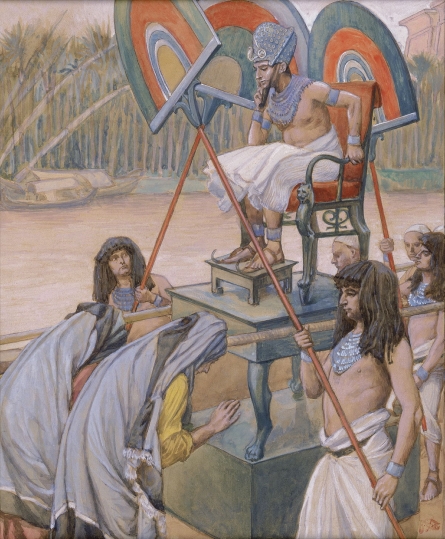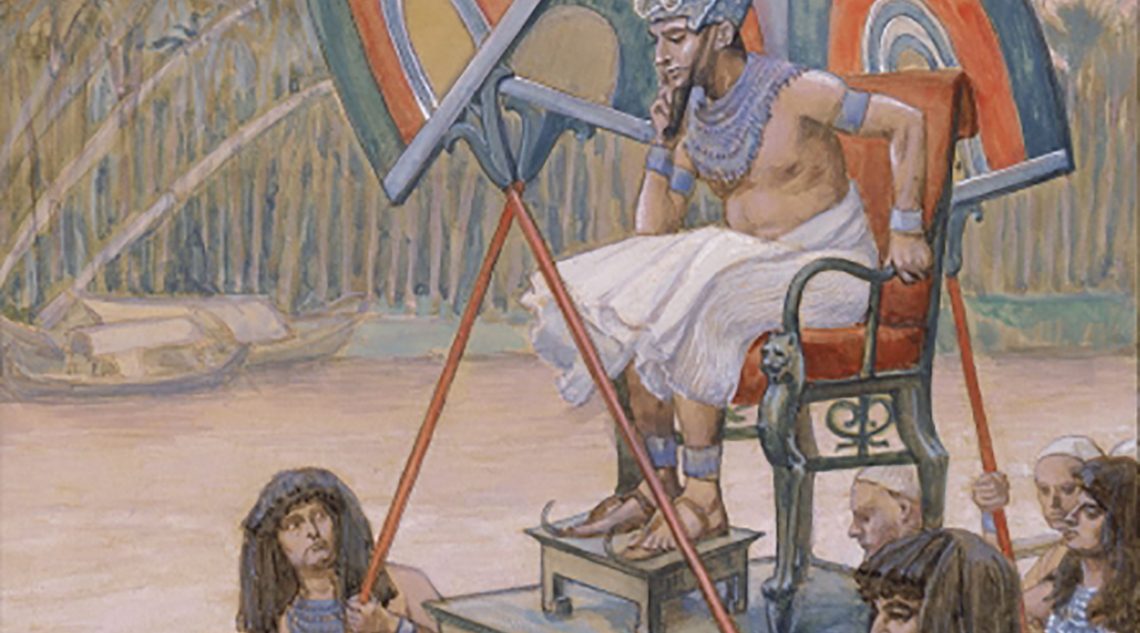 After generations of slavery, it is difficult for people to imagine that they might be free, even free to disobey. And this is the situation we find Israel in at the beginning of the book of Exodus. God is going to need a human leader to help his people rally from their hopelessness and move from the comfort of captivity, to the risk and responsibility of freedom. He needed a special man for this purpose. And as we shall often find in scripture, when God needs a special man, he provides a special woman to prepare that man. Or in this case, a whole team of women.
After generations of slavery, it is difficult for people to imagine that they might be free, even free to disobey. And this is the situation we find Israel in at the beginning of the book of Exodus. God is going to need a human leader to help his people rally from their hopelessness and move from the comfort of captivity, to the risk and responsibility of freedom. He needed a special man for this purpose. And as we shall often find in scripture, when God needs a special man, he provides a special woman to prepare that man. Or in this case, a whole team of women.
Robert Anthony has said, “When you blame others, you give up your power to change.” Surely Jochebed had plenty of reason to blame others. Her people had endured four centuries of slavery under the greatest Empire the world then knew. The Israelites were segregated, only allowed to live in one small area of Egypt. But throughout this story, Jochebed refuses to retreat into blame and self-pity: she takes initiative, she plans for the future, and she acts decisively.
What a contrast with Pharaoh, ruler of that great Empire, served by tens of thousands, builder of great funerary accommodations for himself, who, encountering what he saw as a problem, decided to blame others; He blamed the Israelites.
The children of Israel were fruitful, and increased abundantly, and multiplied, and grew exceedingly mighty; and the land was filled with them. Exodus 1:3
A strange cycle had occurred in Egypt. Joseph had been brought there a slave, a slave who eventually saved his own family and the Egyptian people and Empire from death through famine, but at great cost. We forget that Joseph also enslaved the Egyptian people. The grain he had stored during the fat years he sold to them during the lean years. But over the seven years the cost for that grain was dear.
First they paid all their money. When that ran out they exchanged their livestock—which they could not feed anyway—for grain so that they did not starve. And when they had no more livestock, they sold themselves to Pharaoh. So the slave who became Viceroy of Egypt enslaved all the Egyptian people. And eventually, Pharoah returned the favor: when he thought the Israelites grew too numerous, he enslaved them. When they continued to grow despite hard labor, he commanded genocide. Throughout history the justification for genocide has remained the same. There are too many of them. They are the problem. Kill them.
For some reason, predators have always found killing babies more palatable than executing adults, So of course, that’s where Pharaoh focused his efforts at genocide.
Pharaoh first approaches the midwives. If they will literally kill the boys in their cribs, time will take care of Pharaoh’s declared problem. Eliminate all the boy babies, and eventually the race will die out. The women and girls will marry the Egyptians, the names of the Israelites will be lost. Israel will be no more. Pharaoh no doubt reckons that because midwives were often widows or other unattached women, they would have no recourse but to obey.
The king of Egypt spoke to the Hebrew midwives, of whom the name of the one was Shiphrah, and the name of the other Puah, and he said, “When you perform the duty of a midwife to the Hebrew women, and see them on the birth stool; if it is a son, then you shall kill him; but if it is a daughter, then she shall live.”
Note that the midwives are named. That’s the author’s way of telling us these women are important. He could have just referred to them as “midwives,” but he tells us there are two, named Shiphrah and Puah. And the source of their importance quickly becomes evident: they refuse to cooperate with Pharaoh’s command.
But the midwives feared God, and didn’t do what the king of Egypt commanded them, but saved the baby boys alive.
When summoned to explain their failure to comply, they dissimulate.
The king of Egypt called for the midwives, and said to them, “Why have you done this thing, and have saved the boys alive?”
The midwives said to Pharaoh, “Because the Hebrew women aren’t like the Egyptian women; for they are vigorous, and give birth before the midwife comes to them.”
In other words, “Don’t ask us to do it; we get there too late.”
Pharaoh apparently bought this explanation. It’s surprising, but it shouldn’t be. Speaking as a man, I can tell you men are mystified by women. We are mystified by women in general, but women’s physiology, their bodily functions, menstruation and childbirth—these are mysterious and baffling beyond understanding for most men. This male cluelessness regarding women shows up repeatedly in scripture.
For example, there is the account of Laban catching up to an escaped Jacob and his clan at Mount Gilead. There Laban confronts Jacob concerning his missing household gods. Not knowing that Rachel has taken them, Jacob claims innocence and challenges Laban to search through his entire camp to find them and that, if they are found, whoever has taken them shall die.
Rachel, of course, knows that she stole them, and knows that she has to act quickly or they will be found and her life will be forfeit. In her tent, she places the items under a camel saddle, and then sits on the saddle. When Laban comes to search her belongings, she remains seated, saying:
“Don’t let my lord be angry that I can’t rise up before you; for I’m having my period.”
She’s counting on male squeamishness, and she is not disappointed. Laban retreats, as she knew he would, without going near the camel saddle.
Something like that is at work here. Pharaoh has no idea about childbirth, and no curiosity either. Being Pharaoh, Lord of Lower and Upper Egypt does not make a man immune to male bafflement when it comes to female physiology. So when the midwives tell him that the Hebrew women are all more vigorous and uniformly give birth rapidly, Pharaoh buys it.
These lowly midwives defy Pharaoh’s authority, and blatantly mislead him. They are nonetheless rewarded by God explicitly for these actions.
God dealt well with the midwives, and the people multiplied, and grew very mighty. Because the midwives feared God, he gave them families.
Note that we know the midwives’ names, but not those of their husbands. Thus the text implicitly recognizes them as the heads of their families. Israel may not have been ready for this. Probably its culture could not adjust to such a thought. Yet, as the inspired author tells us, God gave families to the midwives, and we know the families only by the names of Shiphrah and Puah.
Rabbinic tradition holds that Shiphrah and Puah where mother and daughter, and further that this mother and daughter were in fact Jochebed and Miriam! If that is true, then the next verses serve as confirmation that God honored his promise to the midwives, as it shows Shiphrah/Jochebed getting married and bearing a child. Certainly the spirit of the midwives in this episode will be echoed by Jochebed and Miriam as they conspire to save Moses from Pharaoh’s death decree.
Frustrated by the midwives failure, Pharaoh next commands that all the boy babies be thrown the Nile. And with that, Exodus chapter 1 ends.








